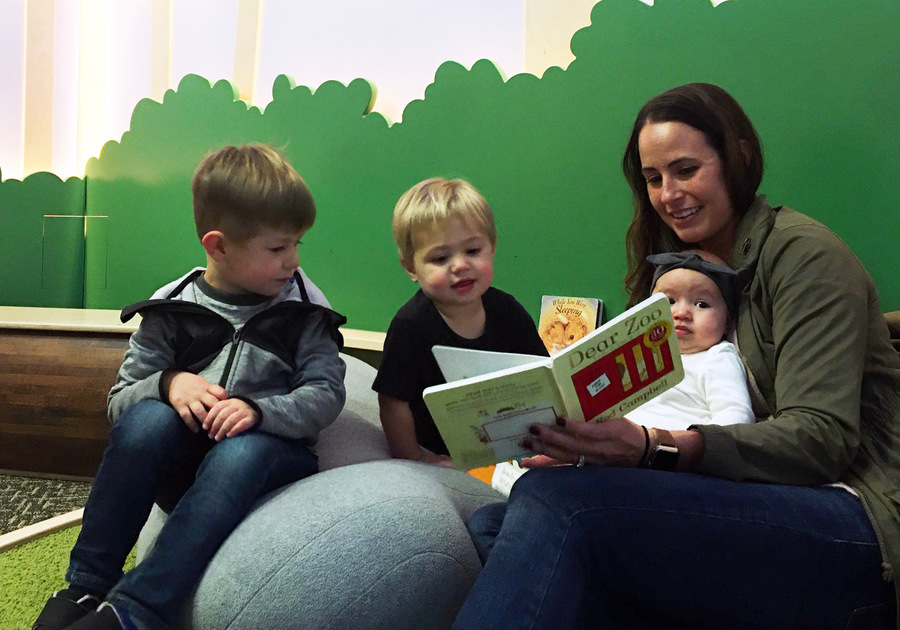Early childhood champions throughout the Richmond region are getting back to The Basics…literally! A wide variety of nonprofit organizations, social services and government agencies, school systems and healthcare entities are rallying around The Basics, which are five simple and powerful things that parents, caregivers and child care providers can do to help young children thrive in the early years.
The Basics provide the framework and easy-to-use tools for interacting with little learners in fun and meaningful ways. These five evidence-based parenting and care-giving principles can benefit children from all backgrounds and across the spectrum of socio-economic factors:
- Maximize Love, Manage Stress
- Talk, Sing, and Point
- Count, Group, and Compare
- Explore through Movement and Play
- Read and Discuss Stories
Founded in Boston by Ron Ferguson, Ph.D., The Basics, Inc. grew out of the Achievement Gap Initiative at Harvard University in partnership with the Black Philanthropy Fund. Amy Bartilotti, coordinator of the Office of Family & Community Engagement at Chesterfield County Public Schools, heard Dr. Ferguson speak at a conference in 2017 and immediately knew she wanted to bring The Basics to RVA.
“The Basics give parents and caregivers the tools to encourage brain development long before a child starts formal schooling in kindergarten,” said Bartilotti. “The five principles are so simple and yet they’re a huge game-changer, leveraging everyday learning opportunities to nurture a child’s natural curiosity about their world and give them confidence to keep exploring.”
“Science shows that 80 percent of brain growth happens by the age of three,” said Meg Pienkowski, Ph.D., vice president of community partnerships and programs at Smart Beginnings Greater Richmond, a regional school readiness initiative providing leadership for The Basics. “Young brains develop like little muscles, getting stronger the more that families and child care providers interact with and are responsive to babies and toddlers.”
All of The Basics can be integrated seamlessly into a child’s day-to-day routine. Best of all, there’s no purchase required to implement any of the five principles. “Singing, dancing, talking, pointing, counting and reading are just a few examples of how a parent or caregiver can use The Basics to be a child’s first teacher in the all-important early years from birth to age five,” said Dr. Pienkowski. “We want to assure parents that they are doing a great job and to keep it up by trying an additional fun, brain-building activity from The Basics with their little one.”
Many child care centers in RVA have enjoyed creating hands-on projects tied to The Basics. “We sent home a kit of pasta in different colors along with a list of things to do with the noodles such as sorting, counting, comparing and grouping them,” said Peggy Moore, director of Bon Air Baptist Preschool. “We aimed to demonstrate how parents can use items in their homes as teaching tools—it’s just that easy.”
According to Marie Harper, director of Salisbury Presbyterian Preschool, some effortless opportunities to use The Basics occur when adults are driving in the car with their preschool passengers. “Point to a street sign and talk about its shape and color,” she said. “If there’s a picture on the sign, such as railroad tracks, talk about what that means. Take advantage of environmental print in everyday life such as store signs, candy wrappers and food labels, to help children make important connections.”
One of the most ardent advocates of The Basics is Virginia First Lady Pamela Northam, a former pediatric occupational therapist and science educator. “The Governor and I believe every child in Virginia is capable of success in school and beyond if given access to the resources they need,” she said. “The Basics are a simple, but vitally important, set of steps we can all follow to ensure we support our children’s healthy development. For example, every family walk is a great opportunity for a ‘Count, Group, and Compare’ activity. Growing up in Hampton Roads we loved collecting shells, flowers, and pinecones. These simple activities are the building blocks of STEM (Science, Technology, Engineering, and Math) education and can lead to a deeper dive of learning through ‘Reading and Discussing Stories,’ another principle of The Basics.”
The website, rvabasics.org, features free, downloadable Tip Sheets with a list of suggested activities for each of the five principles of The Basics along with other resources designed for specific audiences such as parents and caregivers, educators, healthcare providers, faith-based organizations and the community.
In addition to Smart Beginnings Greater Richmond, collaborative partners for The Basics in the Richmond region include Chesterfield County and Chesterfield County Public Schools, Children’s Museum of Richmond, ChildSavers, ExCELL, Family Lifeline, Hanover County, Henrico County Public Library, Lewis Ginter Botanical Garden, Library of Virginia, Reach Out and Read, Richmond Public Library, Science Museum of Virginia, VCU Health, Virginia Museum of Fine Arts and VPM Early Childhood Education.
For more information about The Basics, visit rvabasics.org or “Like” The Basics on Facebook.



